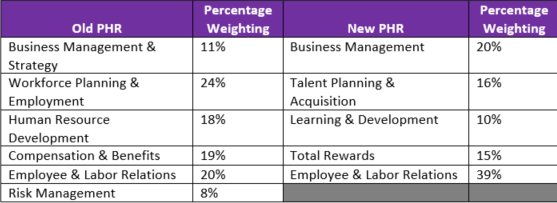Changes are coming soon for the exam to earn a Professional in Human Resources® (PHR®) credential from HR Certification Institute® (HRCI®). If you are not yet a PHR credential holder, you may be wondering what these changes mean. Let’s take a high-level look at the old PHR, which expires July 31, 2018, compared to the new PHR, which takes effect August 1, 2018:

You’ll most likely notice a few things:
But what exactly does this mean? The best way to find out is to take a close look at the new 2018 PHR Exam Content Outline, in effect August 1. You will notice that the outline includes:
If you are already familiar with the current PHR and SPHR Exam Content Outline, combining both certifications and in effect until August 1, either because you have taken the PHR before or you are using study materials that are based on the outline, you may have additional questions:
Here’s a look at some possible scenarios and how you might want to proceed:
|
I have taken the PHR before and did not pass. Should I test before the new exam comes out or should I test after? |
That depends on you and your experience. Do you have experience performing most of the responsibilities on the current PHR/SPHR Exam Content Outline? If so, you may wish to test before the PHR changes. If not, then review the new PHR Exam Content Outline. If your current HR experience matches the new outline, then you may want to test on August 1 or later. |
|
I haven’t tested before, but I have invested in study materials and/or classes that are linked to the PHR/SPHR Exam Content Outline in effect prior to August 1. Does that mean I have to test before the change? |
No, you do not have to do so, but may wish to do so. The exams are based on the exam content outline that is in effect at the time you test. They are not based on preparation materials or classes. |
|
A colleague told me I should sign up for both exams and only take the PHR if I don’t pass the SPHR. Is that still a good approach? |
A professional certification exam is not something you can just study for since you will be tested not just on knowledge, but on your ability to apply your knowledge in answering practice-based questions. If you are not currently operating at a senior HR professional-level, then the PHR exam is probably the only one you should take. However, if you are determined to take this approach, be sure to schedule both appointments on or before July 31, 2018. |
|
What happens if I have a medical emergency that prevents me from testing by July 31? |
If you must reschedule to take the exam August 1 or later, you will be taking the new exam. There can be NO exceptions, regardless of the circumstances. |
|
I have HRCI Second Chance Insurance. Does this mean that I will have to retest before August 1, 2018, if I don’t pass? |
Second Chance Insurance gives you the ability to take the same level of exam after a 90-day waiting period. However, depending on when you test the first time, your exam may be based on the new exam content outline. Make sure to review both documents at www.hrci.org/eco in case this happens. |
PHR exam content outline changes occur every few years, but PHR exams are regularly updated to reflect changes in HR practice, including changes in laws and regulations. Therefore, even if you test more than once under the same exam content outline, you would have encountered different questions on different topics.
Best of luck on your exam. HRCI looks forward to welcoming you into our elite community of certified HR professionals in the very near future.
Related Blogs from HR Leads Business: